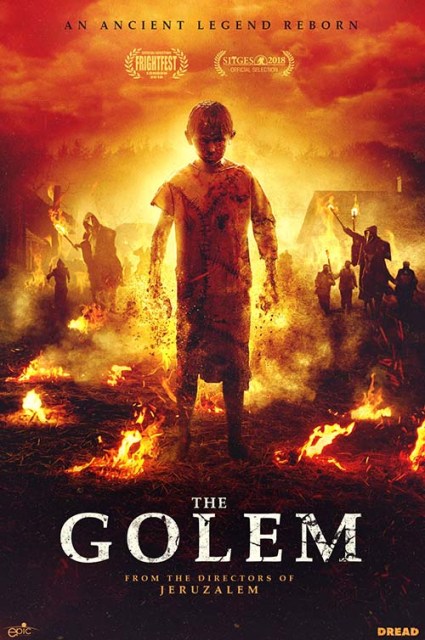
A remote Jewish village is threatened by a plague and dangerous outsiders. While the men of the village believe prayer is the best course of action, one woman believes the village has to stand up for itself and fight. She performs a ritual to bring forth an ancient being that can protect those she loves. Yet this entity is something that cannot be controlled.
Brotherly directing duo Doron and Yoav Paz (Jerusalem) take the intriguing script by Ariel Cohen (Take Mama) and turn The Golem into a stunning film. The plot focuses on Hanna, a woman ahead of her time in this small Jewish village. She is a unique character because she is very independent and eager to learn more about her religion from books women are not allowed to read. As the film progresses it becomes clear she wants to read these texts as a way to grieve her deceased son. Her grief, independence, and unwillingness to have another child for fear of losing them drives her actions throughout the film. When the people she loves are threatened by outsiders bringing in the plague, she takes what she learns from those texts to bring forth an ancient entity known as a golem. These plot elements allow the filmmakers to create an external conflict (the outsiders and the plague) as well as an internal conflict (grief over the loss of a child).
From the moment Hanna creates the golem there is a sense of impending doom. The feeling of dread is carried out through to the end of the film. As a result, audiences know things are not going to end well, but it is the way events play out that keeps them interested in what happens next. There is an opening scene that sets the tone of the film, but there is one instance in this opening that doesn’t quite match the mythology established later in the film. It can lead to a bit of confusion regarding the rules surrounding the golem’s existence. The end of the film also leaves me with some unanswered questions, specifically about the fates of certain smaller characters, which are never resolved. These issues are subtle, making them easier to overlook, but I still believe they are worth pointing out.
As far as the performances go, the entire cast blew me away. Hani Furstenberg (The Loneliest Planet) is absolutely extraordinary as Hanna. There are many layers to Hanna that Furstenberg stunningly conveys. She shows the audience how Hanna finds strength in her grief in order to do the impossible, yet that grief may also be her downfall. Furstenberg commands your attention every time she is on screen. Another standout performance comes from Ishai Golan (Prisoners of War) as Benjamin, Hanna’s husband. Benjamin is very supportive of Hanna, despite what others think about her and their relationship. When things go from bad to worse in the village, Golan’s performance really shines and shows his character’s depth. The pair have great onscreen chemistry, and they are a joy to watch. I also want to give a special shoutout to Alex Tritenko (When the Dawn Comes) who plays the film’s villain in a way that makes you loathe him while also empathizing with his character.
Artistically, there are highs and lows throughout the film. The best bit of artistry in the film is the cinematography. Many shots are framed and lit in such a way that draws the audience’s eye and creates stunning imagery. Along with the cinematography, the set and costume design is fantastic. Not only do these elements add to the beauty of the film, but they also transport you back in time.
One of the less successful elements of The Golem is the special effects. The filmmakers implement practical effects which are enhanced by CGI. The problem arises in some of the bloodier scenes where the effects take on a Tarantino-esque level of blood spewing into the air. It looks quite out of place with the overall look of the rest of the film. Similarly, the score by Tal Yardeni (Noble Savage) doesn’t mesh well with the film’s somber look and feel. The score itself is very nice and is especially beautiful in the more melancholy scenes. Yet the score in the thrilling scenes stands out for all the wrong reasons. To my ears, the music in these scenes sounds more like what one would hear in a suspenseful action movie, not a gloomy horror film. Unfortunately, the music in these scenes takes me out of the moment because of how mismatched it sounds.
The Golem delivers a unique story rooted in Jewish tradition that is both beautiful and disturbing. The internal and external conflicts Hanna experiences provide a dynamic and intriguing plot for audiences. Furstenberg’s portrayal of Hanna drives the film while giving it a lot of heart, and the entire ensemble cast shines. The Golem is quite gorgeous to look at. Even the visual and musical elements that detract from the film are well done, they just don’t go along with the overall tone of the film. If you’re looking for a horror film that doesn’t center around Catholicism, demons, and the devil, then The Golem will be the breath of fresh air you won’t want to miss.
OVERALL RATING: 8/10